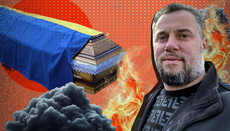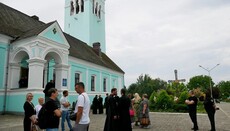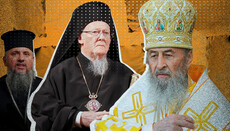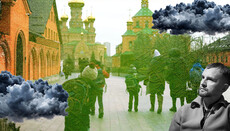On the problems with hearing, vision and understanding
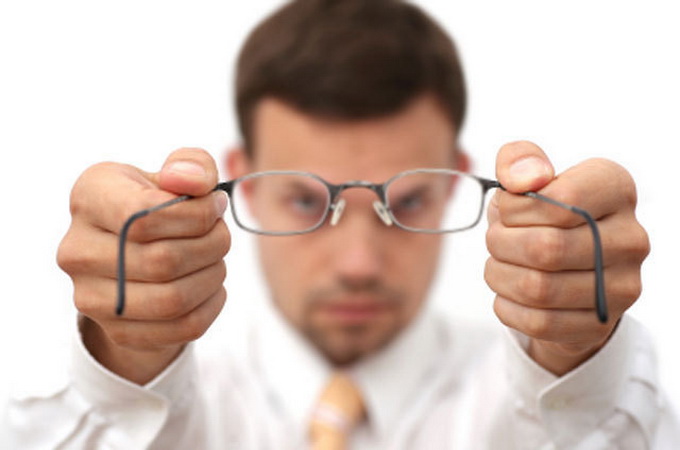
Apparently, the Primate of the Russian Orthodox Church's message did not fit into the image of the head of the Russian Church, which is imposed on the Ukrainian society by particular media. There was nothing to pick on. Therefore, this time the domestic media, which usually react violently to every action or statement by the Patriarch, limited themselves to news reports in a moderately negative spirit.
Perhaps, the only publication in which the author made an attempt to "suck from a finger" the material for the whole article was published in the online edition of the Business Capital. It is written by Catherine Shchetkina, a well-known religious "analyst". However, her "analysis" is quite peculiar. In it, as a rule, there is no reference to the facts - instead, the reader is invited to subjective emotional divination and assumptions. Such human behavior analysis method can be called "psychoanalytical" when, instead of a direct analysis of the content of the statements and actions, the analyst begins to resort to hidden motives, subconscious reactions, hints, conspiracy theories, etc. Not surprisingly, this approach offers infinite space for personal perverted fantasies of the author and opportunities earn fees from scratch.
Meanwhile, anyone can visit the site "Patriarhiya.ru" and read the text of Patriarch Kirill. Firstly, it is addressed not only to Petro Poroshenko, but to "all the inhabitants of Ukraine dear to my heart."
That is Patriarch with respect and courtesy calls on all the Ukrainians on the Day of Independence. The message says: "In 1991, Ukraine chose the path of independent development, having embarked on which, it went into a different reality, and faced with a host of new, often formidable challenges. One of them, to my deep regret, continues to be the conflict in the east of the country."
The content of this passage is completely clear and unambiguous. You need to have a strong bias to attribute the Patriarch some hidden background of his words.
Yes, by choosing independence, Ukraine took the responsibility for the fate of the state. Yes, this responsibility also means that the new state is solely responsible for all challenges. And the current conflict in the East of Ukraine is not the first among such challenges: suffice it to recall the dramatic events of the fall-winter 2004-2005, or winter 2014.
But who in their right mind would argue that what is happening now in the East is the most serious challenge in the modern history of Ukraine?
In his address to the head of the Ukrainian state, the Patriarch expressed confidence that "the peacekeeping efforts of the canonical Ukrainian Orthodox Church will contribute to the creation of civil peace and accord in the society", that he "hopes for the development of constructive church-state interaction in Ukraine." Patriarch Kirill "offers prayers for the welfare of all citizens of Ukraine, softening the hearts of fierce feuding and reconciliation." He wants people of Ukraine mental and physical strength and help from the Lord in good undertakings.
It is clear that the short greetings include a wish for peace, and a prayer, and care of every Ukrainian Christian believer. This is a kind, short and soulful text.
There was no "suddenly", as well as the "reactivation". The Patriarch has many times appealed to the Ukrainian people with a variety of messages. Therefore there is nothing strange and surprising in the fact that he addressed the Ukrainians and the Ukrainian President on the anniversary of the Independence Day.
The Patriarch does not need to hint someone about something, because he always has an opportunity to speak directly. Naturally, he could not fail to mention the conflict in the East, as it is being discussed by all the faithful of Ukraine, including non-Orthodox ones.
Absolutely logical is a positive assessment of the ROC head of the "peace efforts of the canonical Ukrainian Orthodox Church." Firstly, because it is true, secondly, should he condemn the Ukrainian Orthodox Church of the desire for peace and overcoming war?
The Church hierarchy of such a rank does not need to be reminded of himself, so his words mean what they mean, including the Patriarch’s thesis that the "church-state relations should be "constructive." Each literate person can find words that Patriarch Kirill "hopes for the development of a constructive church-state interaction in Ukraine."
The Ukrainian Orthodox Church has always stood for peace in the East of Ukraine and in this regard turned to the Patriarch. Here is, for example, a quotation from the letter of the Locum Tenens of the UOC to His Holiness Patriarch Kirill of 1 March 2014: "I address to you, Your Holiness, with a request to do everything possible to prevent the bloodshed in Ukraine. I ask you to raise your voice to preserve the territorial integrity of the Ukrainian state. In this difficult hour we raise fervent prayers to our Lord Jesus Christ so that He by the prayers of the Blessed His Mother will protect from the clash fraternal Russian and Ukrainian peoples."
The next day, March 2, 2014, which is an unprecedented short period of time for the church bureaucracy, Patriarch Kirill gave an answer called "Message of His Holiness Patriarch Kirill of Moscow and All Russia to the Locum Tenens of the Kiev Metropolitan Department Metropolitan Onuphry of Chernovtsy and Bukovina, archpastors, pastors and all faithful children of the Ukrainian Orthodox Church in connection with the situation in Ukraine."
It very clearly says, "the children of our Church are people of different political views and convictions, including those who now stand on the opposite sides. The Church does not take one side or another in a political struggle. But the duty of the Church is to feel concerned about those who are exposed to violence, who need protection, whose life is in danger."
There is a direct promise of the Patriarch, "In response to your appeal, dear Lord, I can assure you and our Ukrainian flock that I shall do everything possible to convince all those in power to prevent the death of innocent people on the dear to my heart Ukrainian land."
And what else could the Church do, except pray and convince?
Secular analysts and the media often think of the Church as a kind of geopolitical mechanism, a sort of "magic wand", which terminates war and restores peace. But in such an approach there is more from pagan magic than from Orthodox Christianity.
Those media are constantly manipulating, making the Church responsible for something that it is not relevant to it. Did the Church start the war in the East of Ukraine? Is it responsible for thousands of the dead, destructions, millions of refugees’ broken fates?
What a journalistic manner – to force the Church to justify itself? Can you tell the truth that the Church itself is a victim of the geopolitical conflict, like the rest of Ukraine?
And if someone finds "questionable" the role of mediator in the Ukrainian-Russian relations Patriarch Kirill is allegedly "trying on" (Patriarch has never talked about that, but the mediation mission is natural to the Church), then why not advance similar claims to the Pope and the Catholic cardinals? There are statements of the Pope on the "fratricidal war" and the words of Archbishop Gugerotti that in the East of Ukraine the Ukrainian army is fighting with the separatists.
Recall that in Havana there was adopted a joint declaration of the Patriarch Kirill of Moscow and All Russia and Pope Francis, where a deep sorrow was expressed "about the confrontation in Ukraine, which claimed already a lot of lives, caused countless sufferings to civilians, and plunged the society into a deep economic and humanitarian crisis." The Declaration called on "all parties to the conflict to prudence, social solidarity and active peacemaking" and the church "to work for the achievement of the public consent to refrain from engaging in confrontation and not to support the further development of the conflict."
What will the media say, if the Pope Francis expresses the wish to become a mediator in the Ukrainian conflict? Will they also find his role "questionable"?
The true reason for the negative reaction of the Ukrainian mass media on the Patriarch's message was not Christian anger at the fact that he calmly and without negative emotions congratulated the leadership of the country and his Ukrainian flock on a state holiday.
And if to speak about the challenges facing the current Ukrainian statehood, among them, alas, is not only the conflict in the East but also the manipulation of journalists who, for personal reasons, misinterpret the words of other people, including the leaders of the Church.
0
0
If you notice an error, select the required text and press Ctrl+Enter or Submit an error to report it to the editors.
Read also
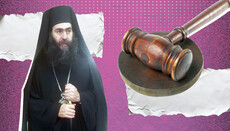
Bishop and secular justice
16 January 17:29
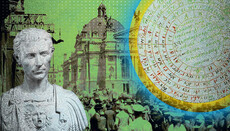
Why Lviv residents once defended “Muscovite” Christmas
15 January 13:55






